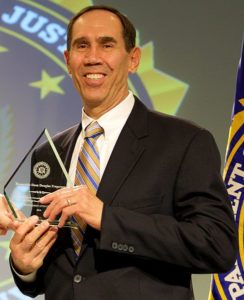
You may recall that the City is claiming that linking speech restrictions on the Boardwalk to the time the sun sets is accomplishing some rational purpose. First amendment jurisprudence allows such restrictions, but the purpose must be accomplished by the least restrictive means necessary. Thus it doesn’t portend well for the City, or at least for the fate of the motion to dismiss, that Pregerson repeatedly questioned Ugaz on how using the time of sunset could possibly be the least restrictive means. He mentioned that it occurs at different times during different seasons, for instance. This prompted Ugaz to claim that the City wants to clear the view of the ocean at sunset and that “people are coming home then.”1 The judge noted again that the sun sets at widely varying times, so how does anyone know when people are coming home. This prompted Ugaz to admit that “perhaps that wasn’t the best reason.”
Everyone then agreed that the City can prohibit overnight use of the Boardwalk, and Ugaz then repeated the City’s weird argument that leafletting on the Boardwalk isn’t even the best way for the Venice Justice Committee to reach its target audience. I mean, maybe it’s not, but what does that have to do with anything at all? How is it the government’s business how people choose to accomplish their goals through protected speech? If the Venice Justice Committee wanted to, e.g., dress up like Jesus and bounce around on a pogo stick singing Uriah Heep2 songs, the City might be justified in restricting them to accomplish some reasonable purpose,3 but not because their methods are stupid. That really has to be up to the speakers, not the regulators.
Finally, the City kept hitting their silly point that the Boardwalk is a park, not a sidewalk, despite the fact that the plaintiffs have proved pretty conclusively that it’s a sidewalk. When Carol Sobel took the lectern, she argued that it was a sidewalk. Pregerson didn’t seem too impressed by the dispute, though, and asked her a number of times why it mattered. She replied that there were differences in when and how much the City was allowed to restrict access to sidewalks in contrast to parks and in what kind of a public forum each was considered to be. The judge didn’t seem to think it mattered, but he did tell her that he didn’t think they actually disagreed with one another.
Next Sobel argued that the City was classing leafletting and soliciting donations as vending, and that this is prima facie unconstitutional. This claim is based on the statements of some cops as they told Peggy Kennedy to pack it up. The judge was skeptical of this, claiming that it was possibly just a misunderstanding on the part of the police rather than City policy. Sobel’s response to this was that the lack of training that would allow LAPD officers to make that mistake repeatedly evinces a de facto City policy.4
It was an interesting hearing, and it strikes me from the judge’s questioning that he will not grant the motion to dismiss. He clearly thinks there are questions of fact to be decided with respect to the use of the time the sun sets, which is probably enough all by itself not to dismiss. We’ll see what happens!
Edited to add Sara Ugaz’s name, who couldn’t hear in court, but which I found on some paperwork.
Image of Dean Pregerson is freely licensed and available via Wikimedia.
- I don’t know what that’s supposed to mean any more than you probably do.
- The band, not the Dickens character.
- E.g. more to do with traffic control than the fact that Uriah Heep’s music is stuporifical.
- I ran out of paper to take notes on, so that last bit is from memory and therefore may be wrong. I apologize for any mistakes.
